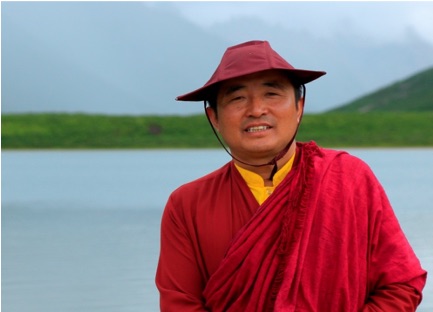Seen through the eyes of activists, farmers, and journalists, Waking the…
Searching for Sacred Mountain

- Description
- Reviews
- Citation
- Cataloging
- Transcript
View on The Global Environmental Justice site
Curator
This film was selected by Rosemary Carbine, Associate Professor of Religious Studies, Whittier College
Why I chose this film
I have used this film in a comparative religion and ecology class and found it fruitful to raise students’ global and religious studies awareness about the inextricable interrelationship of ecological and social issues from Buddhist perspectives.
Teacher's guide
Download the Teacher's Guide (PDF) for maps, background information and suggested subjects, questions and activities.
Synopsis
The Tibetan monastery at Baiyu rests in the brilliant Nianbaoyuze mountain range, a sacred and nationally protected park. This mountain range is the epitome of intersections between religion and environment and China—and a key element in Searching for Sacred Mountain.
The documentary tells the story of Liu Jianqiang, an investigative environmental journalist and Beijing editor of chinadialogue who has recently converted to Buddhism. The documentary includes footage of senior Chinese government officials declaring their commitment to an ‘ecological civilization’ that draws on Buddhism, Daoism, Confucianism, and other Chinese cultural traditions as a means of addressing the country's growing environmental challenges. It also shows that leading Chinese academics are making the connection between such traditions and the protection of vulnerable lands and habitats.
Peking University conservation biologist Dr. Lü Zhi is featured in the program, discussing the remarkable success of the Buddhist communities that have been able to preserve old growth forests for centuries.
"When I first visited the Tibetan region in the 1990s I was surprised by what I found. At that time there was a lot of logging going on, but in some areas the original forest was preserved. There were huge trees 600 and 700 years old. In some of these areas the animals were not afraid of people. I thought this was very strange; why were these areas preserved? I asked the local people how this happened and they said, “Oh, this is our sacred mountain.” But what did that mean? How could this be possible?” -
"“Buddhism’s approach to the concept of protection is through an act of self-discipline. We’ve often wondered which would work best: laws which are based on punishment or economic incentives which are based on financial rewards. The Buddhist system is different. It comes from the heart of the people.” - Conservation Biologist Dr. Lü Zhi, Peking University
Environmental Justice Focus
As environmental justice studies multidimensional intersections of ecological and social issues, this film features Buddhist ethics and practices as a meaningful and scientifically-documented successful way to promote environmental protection in China, especially in Tibetan regions. Climate change, extractive industries, infrastructure plans/construction, industrial pollution and waste disposal, etc. all threaten land, air, water, forests, wildlife habitats, and so on. Buddhist ethics could provide an important means to redress these impacts in China.


